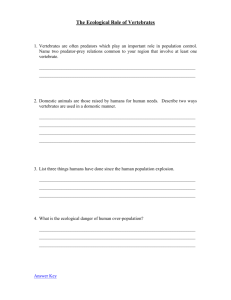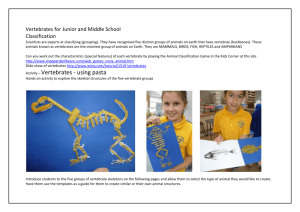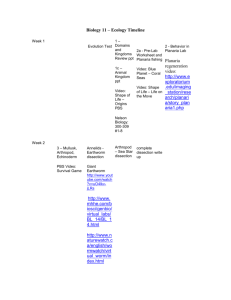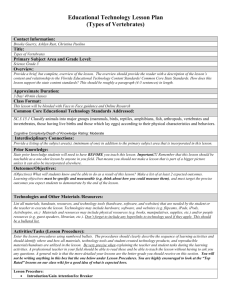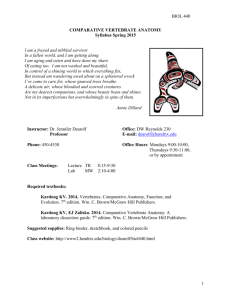Course Syllabus for - University of Wisconsin Oshkosh
advertisement
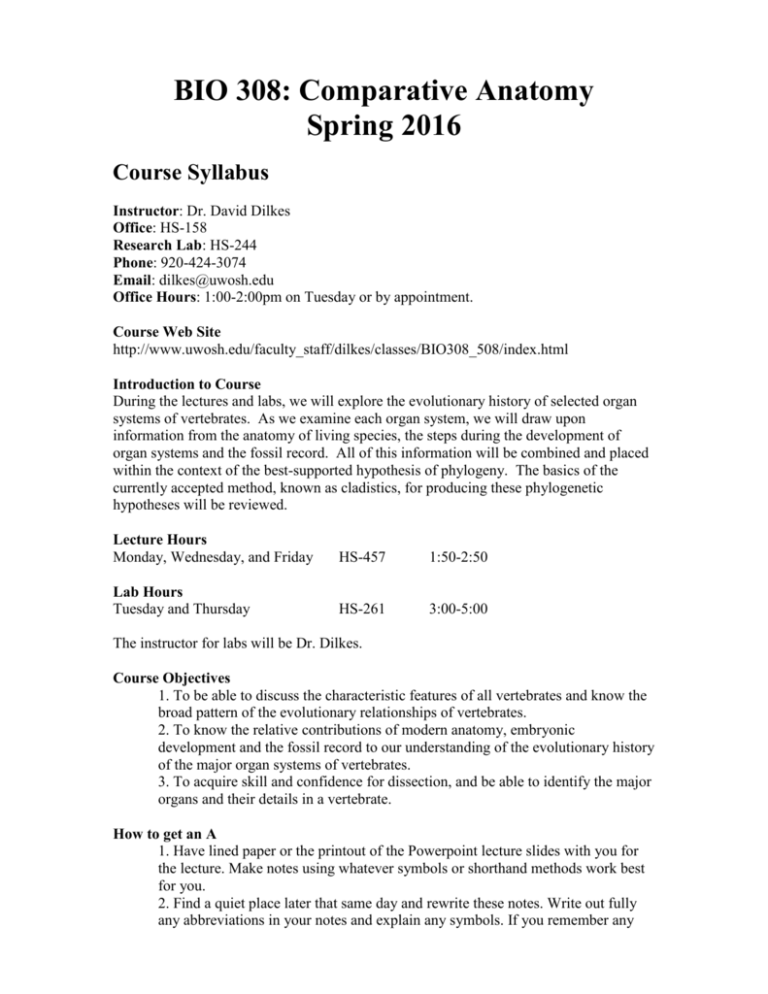
BIO 308: Comparative Anatomy Spring 2016 Course Syllabus Instructor: Dr. David Dilkes Office: HS-158 Research Lab: HS-244 Phone: 920-424-3074 Email: dilkes@uwosh.edu Office Hours: 1:00-2:00pm on Tuesday or by appointment. Course Web Site http://www.uwosh.edu/faculty_staff/dilkes/classes/BIO308_508/index.html Introduction to Course During the lectures and labs, we will explore the evolutionary history of selected organ systems of vertebrates. As we examine each organ system, we will draw upon information from the anatomy of living species, the steps during the development of organ systems and the fossil record. All of this information will be combined and placed within the context of the best-supported hypothesis of phylogeny. The basics of the currently accepted method, known as cladistics, for producing these phylogenetic hypotheses will be reviewed. Lecture Hours Monday, Wednesday, and Friday HS-457 1:50-2:50 Lab Hours Tuesday and Thursday HS-261 3:00-5:00 The instructor for labs will be Dr. Dilkes. Course Objectives 1. To be able to discuss the characteristic features of all vertebrates and know the broad pattern of the evolutionary relationships of vertebrates. 2. To know the relative contributions of modern anatomy, embryonic development and the fossil record to our understanding of the evolutionary history of the major organ systems of vertebrates. 3. To acquire skill and confidence for dissection, and be able to identify the major organs and their details in a vertebrate. How to get an A 1. Have lined paper or the printout of the Powerpoint lecture slides with you for the lecture. Make notes using whatever symbols or shorthand methods work best for you. 2. Find a quiet place later that same day and rewrite these notes. Write out fully any abbreviations in your notes and explain any symbols. If you remember any BIO 308 – Comparative Anatomy page 2 of 10 additional information from the lecture, then include it. Fix or redraw any illustrations made during the lecture. 3. These clarified and expanded notes become your study notes for each lecture exam. Questions on the lecture exams will be based on information in the lectures so it is important to make your notes complete and accurate. If you’re uncertain about some point in the lecture, ask another student or contact me. 4. Review your notes frequently, not simply the night before the exam! Don’t forget to practice spelling of the many anatomical terms. Textbooks and Materials for the Course Recommended Textbook Liem, K.F., W.E. Bemis, W.F. Walker, Jr., and L. Grande. 2001. Functional Anatomy of the Vertebrates. An Evolutionary Perspective. 3rd edition. Brooks/Cole, a division of Thomson Learning, Inc. Required Lab Manuals 1. De Iuliis, Gerardo and Dino Pulerà. 2011. The Dissection of Vertebrates. A Laboratory Manual. 2nd Edition. Elsevier Inc. 2. Course Packet for BIO308/508. Lab Equipment Most of each lab period will be spent dissecting representative vertebrates. You will need to bring to each lab period your copy of the lab manual, a dissecting kit and a lab coat (or an old shirt). Your text will be useful, although not required. Rubber gloves will be supplied. The dissecting kit should contain a scalpel with replacement blades, a pair of small and large scissors, forceps and blunt and sharp probes. No food or drinks are allowed in the lab. Lecture Schedule for Spring 2016 Lecture Date Lecture Topic # 1 Monday February 1 Introduction to the Course 2 Wednesday February 3 Chordates 3 Friday February 5 What is a Vertebrate? 4 5 6 7 8 9 Monday February 8 Embryology: Cleavage, Gastrulation, and Neurulation Wednesday February 10 Embryology: Cleavage, Gastrulation, and Neurulation Friday February 12 What’s New in Anatomy? Vestigial Organs in Mammals Monday February 15 Integument: Skin and Scales Wednesday February 17 Integument: Feathers, Hair, Horns, and Antlers Friday February 19 Inside Nature’s Giants: The Great White Shark Monday February 22 LECTURE EXAM #1 Lectures 2-5, 7-9 and handout on Readings for Further Detail Chapter 2 Chapter 2 (pgs. 41-43) Chapter 4 (pgs. 131-142, 146-147) Chapter 4 (pgs. 131-142, 146-147) Chapter 6 (pgs. 208-219) Chapter 6 (pgs. 219-225) BIO 308 – Comparative Anatomy 10 11 12 13 page 3 of 10 major groups of vertebrates. Wednesday February 24 Vertebrate Skull: Splanchnocranium and Origin of Mammalian Middle Ear Bones Friday February 26 Pharyngeal Jaws and the Moray Eel Essay Outline Due Monday February 29 Appendicular Skeleton: Evolution of the Pectoral Girdle Wednesday March 2 Muscle Tissues and Branchiomeric Muscles 14 Friday March 4 Digestive System 15 Monday March 7 Wednesday March 9 16 Friday March 11 17 Monday March 14 Digestive System LECTURE EXAM #2 Lectures 10, 12-15 and handouts on Axial and Appendicular Skeletons and Axial and Appendicular Muscles Respiratory System: Principles of Diffusion of Gases, Cutaneous Respiration, and Gills Respiratory System: Lungs 18 Wednesday March 16 19 20 21 22 23 24 25 26 27 Chapter 7 (pgs. 236, 238-264) Chapter 9 Chapter 10 (pgs, 316-318, 321-322, 331-337) Chapter 16 (pgs 534, 551-553) and Chapter 17 Chapter 18 (pgs. 575-585) Chapter 18 (pgs. 585-600) Chapter 19 (pgs. 608-611, 612-622) Circulatory System: Pathways of Blood Flow and the Heart Friday March 18 Inside Nature’s Giants: The Crocodile Monday March 21, NO LECTURES: Wednesday March 23, SPRING BREAK and Friday March 25 Monday March 28 Reading of Essays Essay due before start of class Wednesday March 30 Reading of Essays Friday April 1 Reading of Essays Monday April 4 Reading of Essays Wednesday April 6 Reading of Essays Friday April 8 Circulatory System: Venous System Chapter 19 (pgs. 623-627) Monday April 11 Inside Nature’s Giants: The Elephant Wednesday April 13 LECTURE EXAM #3 Lectures 16-19, 25 & 26 and handout on Respiratory System: Principles of Diffusion of Gases Friday April 15 Nervous System: Nervous Tissue, Chapter 13 (pgs. Spinal Cord, and Spinal Nerves 438-445, 450-456) BIO 308 – Comparative Anatomy page 4 of 10 28 Monday April 18 Nervous System: Cranial Nerves 29 Wednesday April 20 Sensory Organs: Eyes 30 Friday April 22 Sensory Organs: Ears 31 Monday April 25 Urogenital System: Urinary System 32 Wednesday April 27 33 Friday April 29 Monday May 2 34 Wednesday May 4 35 36 37 38 Friday May 6 Monday May 9 Wednesday May 11 Friday May 13 Urogenital System: Reproductive System Inside Nature’s Giants: The Giraffe LECTURE EXAM #4 Lectures 27-33 and handout on the Brain Classroom Presentation of Essay Final Essay due before start of class Classroom Presentation of Essay Classroom Presentation of Essay Classroom Presentation of Essay Classroom Presentation of Essay Lab Schedule for Spring 2016 Lab # Date Lab Topic 1 Tuesday February Introduction to Lab, 2 Body Regions, Directional Terms, Planes of Section 2 Thursday February Exercise in Cladistics 4 3 Tuesday February 9 4 Thursday February Skeletal System: Skulls and 11 Vertebrae Lab Quiz 1: body regions, directional terms, planes of section, and cladistics Tuesday February Dentition, 16 Skeletal System: Postcranium Lab Quiz 2: histology and skulls 5 Exercise in Cladistics – continuation if necessary. Histology Chapter 13 (pgs. 456-466) Chapter 12 (pgs. 424-433) Chapter 12 (pgs. 411-422) Chapter 20 (pgs. 633-641) Chapter 21 (pgs. 660-675) Readings The Dissection of Vertebrates – pgs. xvii-xix Cladistic Analysis – part of lab manual. Functional Anatomy of the Vertebrates Reading – pgs. 10-18 READ BEFORE LAB! BIO308/508 lab manual. Read the sections in Chapter 6 of Functional Anatomy of the Vertebrates on the Integument. Skeleton in Chapters 2, 3, 5, 6, 7, 8, and 9 of The Dissection of Vertebrates Skeleton in Chapters 2, 3, 5, 6, 7, and 9 of The Dissection of Vertebrates BIO 308 – Comparative Anatomy 6 7 8 9 10 11 12 13 14 15 16 17 Thursday February 18 Tuesday February 23 Form and Function of Vertebrates on Land and Water External Morphology, Skinning Lab Quiz 3: dentition, postcranium, and form and function of vertebrates Thursday February Skinning (continued), 25 Superficial Muscles page 5 of 10 External Anatomy in Chapters 2, 3, 5, 6, and 7 of The Dissection of Vertebrates Musculature in Chapters 2, 3, 5, and 7 of The Dissection of Vertebrates Tuesday March 1 Superficial Muscles (continued) Musculature in Chapters 2, Deep Muscles 3, 5, and 7 of The Lab Quiz 4: external Dissection of Vertebrates morphology and superficial muscles Thursday March 3 Deep Muscles (continued) Musculature in Chapters 2, 3, 5, and 7 of The Dissection of Vertebrates Tuesday March 8 Digestive System Digestive system in Chapters 2, 3, 5, and 7 of The Dissection of Vertebrates Thursday March 10 Respiratory System Respiratory system in Lab Quiz 5: deep muscles and Chapters 2, 3, 5, and 7 of digestive system The Dissection of Vertebrates Tuesday March 15 Review for Lab Exam 1 Thursday March LAB EXAM #1 Histology, Skeletal System, 17 External Morphology, Muscles, Digestive System, and Respiratory System March 22 & 24 NO LAB: SPRING BREAK Tuesday March 29 Circulatory System: Circulatory system in Heart and Arterial System Chapters 2, 3, 5, and 7 of The Dissection of Vertebrates Thursday March 31 Circulatory System (continued) Circulatory system in Lab Quiz 6: respiratory Chapters 2, 3, 5, and 7 of system, heart, and arterial The Dissection of system Vertebrates Tuesday April 5 Circulatory System: Circulatory system in Venous System Chapters 2, 3, 5, and 7 of The Dissection of Vertebrates Thursday April 7 Urinary and Reproductive Urinary and Reproductive Systems Systems in Chapters 2, 3, 5, and 7 of The Dissection of BIO 308 – Comparative Anatomy page 6 of 10 18 Tuesday April 12 Urinary and Reproductive Systems (continued) 19 Thursday April 14 20 Tuesday April 19 Nervous System Lab Quiz 7: venous system, urinary system, and reproductive system Nervous System (continued) Sensory System 21 Thursday April 21 Tuesday April 26 Grading Scale Percentage 100-92 91-89 88-86 85-82 81-79 78-76 75-72 71-69 68-66 65-63 62-60 <60 Vertebrates Urinary and Reproductive Systems in Chapters 2, 3, 5, and 7 of The Dissection of Vertebrates Nervous system in Chapters 2, 3, 5, and 7 of The Dissection of Vertebrates Nervous and Sensory systems in Chapters 2, 3, 5, and 7 of The Dissection of Vertebrates Lab Quiz 8: nervous and sensory systems Review for Lab Exam 2 LAB EXAM #2 Circulatory System, Urinary and Reproductive Systems, Nervous System, and Sensory System Grade Marking Scheme for 308 Lecture Exam #1 Lecture Exam #2 Lecture Exam #3 Lecture Exam #4 Essay Outline Essay Reading Essay Presentation Essay Final Lab Exam #1 Lab Exam #2 Quizzes (7 X 2% each) A AB+ B BC+ C CD+ D DF Grade Points 4.0 3.67 3.33 3.00 2.67 2.33 2.00 1.67 1.33 1.00 0.67 0.00 12% 12% 12% 12% 2% 2% 4% 10% 10% 10% 14% BIO 308 – Comparative Anatomy Total page 7 of 10 100% Lecture Exams (48% of your total course grade) Lecture Exams 1-4 will consist of a short answer questions and essay questions. Each lecture exam is scheduled during a regular lecture period and will take no more time than allotted normally for a lecture. Quizzes (14% of your total course grade) Eight quizzes will be held during the scheduled lab periods. Each quiz will consist of short answer questions and labeling of drawings, and take up no more than 10-15 minutes of a lab. The quizzes will be based upon lab topics. The lowest quiz mark will be dropped. Lab Exams (20% of your total course grade) Lab exams 1 and 2 will be a combination of a “bell-ringer” format and short answer questions. Questions for the bell-ringer section will ask you to identify labeled structures on dissected animals, skeletons, and tissue slides within a time limit. The goal of a “bellringer” lab exam is to test your ability to identify those structures that you learned in lab and your understanding of their form and function based upon your observations of materials in front of you. Each lab exam is scheduled during a regular lab period. Important Notes Regarding Lab Exams 1. The second lab exam will not be comprehensive and will include only material learned since the first lab exam. 2. BIO211 (Human Anatomy) will use our lab room (HS261) during the week of March 9 – 13 for a lab exam. This room will not be available during this week outside of our scheduled lab periods. Essay (18% of your total course grade) You will be required to write a short essay on a topic in comparative anatomy. A separate set of pages has been prepared to discuss the essay. If you do not select one of the topics listed in the set of pages, then I must approve your essay topic. A late penalty of 0.5% per day (including weekends) will be deducted from the value of the draft or final essay. Policy for Make-up Exams and Quizzes: In order to write a makeup lecture exam, lab exam, or quiz, you must inform Dr. Dilkes of your absence before the start of the lecture exam or your scheduled lab period. Any student who does not do so may forfeit the chance to write a makeup exam or quiz and a grade of zero will be assigned. It is the student’s responsibility to contact Dr. Dilkes. A message from a family member or friend is not acceptable. Contact may be an email, message on my office answering machine, or a message to the Biology Office (HS142; phone: 424-1102). Documentation is Required for All Make-up Exams and Quizzes Any absence from a lecture exam, lab exam, or lab quiz must be supported by documentation. BIO 308 – Comparative Anatomy page 8 of 10 Makeup Lecture Exams Students who miss a lecture exam (see Acceptable Reasons for Absences below) are offered a make-up so long as documentation is provided. If you miss the makeup exam on the scheduled date and provide documentation, alternate arrangements for a makeup will be made or an incomplete recorded. Without documentation, a grade of zero will be recorded. Makeup Lab Quizzes If you expect to miss your regular lab, then it is your responsibility to inform Dr. Dilkes of your absence and discuss any possible arrangements to write missed quizzes at a later date. Makeup Lab Exam Contact Dr. Dilkes immediately if you cannot write a lab exam. Do not forget documentation. Discuss with Dr. Dilkes any possible arrangements to write a missed lab exam at a later date. Acceptable Reasons for Absences: The only valid reasons for missing a quiz or exam that will be acceptable for a make-up are: 1. Health problems. Serious medical conditions of the student (or their dependent requiring home care); medical emergency of student or immediate family member. Healthcare provider-issued document is required stating general reason and timeframe absent, but not nature of medical problem. Documentation is required a maximum 2 weeks after the fact. 2. Death of immediate family member. Obituary (if student is named) or funeral program. Documentation is required a maximum 2 weeks after the fact. 3. UW Oshkosh activity. Class trip, competition or travel to same (athletics, Model UN, debate). University-issued document stating general reason and timeframe absent (best to have your coach/supervisor/instructor send a TitanEmail to your instructor directly). Minimum one week notice. 4. Civic activity. Jury duty, military service ≤ 2 weeks’ duration, court appearance as defendant or witness. Official-issued document stating general reason and timeframe absent. Documentation is required a maximum 2 weeks after the fact. 5. More than three (3) UW Oshkosh exams on the same day. Photocopy of official class schedule from TitanWeb plus confirmation from other instructors via TitanEmail. Minimum one week notice. Please note that absences due to holiday plans or oversleeping are not acceptable. Changing of Grades in Exams or Quizzes Clerical Error – If you discover an addition error on your exam or quiz, then return it immediately to Dr. Dilkes for correction. Corrections in Grading – Regrading of an exam will only be considered if a written explanation of the problem accompanies the exam. Any lecture notes or text readings that support regrading must be included with the explanatory note. I will only discuss possible regrading in my office and not during a lecture or lab period. Please note that regrading of an exam will not necessarily result in additional marks. The exam grade may increase, decrease or stay the same. BIO 308 – Comparative Anatomy page 9 of 10 Academic Misconduct A university is a community of individuals who have come to together to instruct and learn. Of the many academic and personal goals to be achieved at university, included is the ability to think independently and creatively, hone your written and oral skills for the communication of your ideas and grow as an individual with confidence in your abilities. For the university, it strives continually to improve its ability to instruct effectively and instill in each of its students the self-confidence, skills and knowledge to be successful. Academic misconduct such as cheating and plagiarism harms both the student and university by defeating these goals. A student who cheats fails to acquire the skills, knowledge and self-confidence needed for success, and the university will acquire an undesired reputation. Elimination of cheating and plagiarism is the responsibility of both the university and each student. The University of Wisconsin Oshkosh is committed to a standard of academic integrity for all students. The system guidelines state: "Students are responsible for the honest completion and representation of their work, for the appropriate citation of sources, and for respect of others' academic endeavors." (UWS 14.01,Wisconsin Administrative Code). Students are subject to disciplinary action for academic misconduct, which is defined in UWS 14.03, Wisconsin Administrative Code. Students on the UW Oshkosh campus have been suspended from the University for academic misconduct. Students are encouraged to review the procedures related to violations of academic honesty as outlined in Chapter UWS 14, Wisconsin Administrative Code. The system guidelines and local procedures are printed in the University of Wisconsin Oshkosh Student Discipline Code 2003-2004 and can be found on the Dean of Students website at www.uwosh.edu/dean/conduct.htm. Specific questions regarding the provisions in Chapter UMW 14 (and institutional procedures approved to implement Chapter UMS 14) should be directed to the Dean of Students Office. Below are the details of UWS 14.03. UWS 14.03 Academic misconduct subject to disciplinary action. (1) Academic misconduct is an act in which a student: (a) Seeks to claim credit for the work or efforts of another without authorization or citation; (b) Uses unauthorized materials or fabricated data in any academic exercise; (c) Forges or falsifies academic documents or records; (d) Intentionally impedes or damages the academic work of others; (e) Engages in conduct aimed at making false representation of a student's academic performance; or (f) Assists other students in any of these acts. (2) Examples of academic misconduct include, but are not limited to: cheating on an examination; collaborating with others in work to be presented, contrary to the stated rules of the course; submitting a paper or assignment as one's own work when a part or all of the a paper or assignment as one's own work when a part or all of the paper or BIO 308 – Comparative Anatomy page 10 of 10 assignment is the work of another; submitting a paper or assignment that contains ideas or research of others without appropriately identifying the sources of those ideas; stealing examinations or course materials; submitting, if contrary to the rules of a course, work previously presented in another course; tampering with the laboratory experiment or computer program of another student; knowingly and intentionally assisting another student in any of the above, including assistance in an arrangement whereby any work, classroom performance, examination or other activity is submitted or performed by a person other than the student under whose name the work is submitted or performed. Cheating will not be tolerated in BIO 308. No aids of any type will be allowed during a lecture exam, a lab exam or a lab quiz. Every answer that you submit for grading must reflect your own knowledge and thoughts. Any instance of academic misconduct may result in an academic penalty such as a failing grade on the exam or quiz, a failure in the course or possible expulsion from the university.
